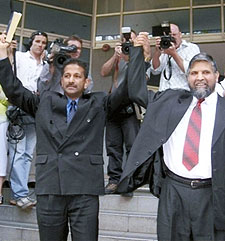Christians are to blame for the passing of a controversial religious hate law, a pastor wrongly convicted of vilifying Muslims has told a Sydney audience.
Churches believed that a "religious discussion’ exemption clause in the 2001 Victorian Racial and Religious Tolerance Act would allow them to still speak freely about other faiths, Danny Nalliah told a meeting at NSW Parliament House on Friday.
“It’s the churches’ fault, we let this bill get through,” he says.
“We said ‘it’s going to fit in very well’.”
But the Sri Lankan-born pastor says the opposite happened.
On 9 March 2002 three Anglo-Saxon converts to Islam attended a church seminar on the Koran and jihad being run by Mr Nalliah’s ministry Catch the Fire.
What followed was a much publicised battle that led to similar legislation being disbanded in Western Australia, South Australia, NSW and the United Kingdom.
The Islamic Council of Victoria (ICV) sued Danny Nalliah and Islamic scholar Daniel Scot in the Victorian Civil and Administration Tribunal, alleging the seminar had breached the act.
The two pastors were subsequently found guilty of presenting material that was hostile, demeaning and derogatory to Muslims.
 In December the pastors won an appeal in the Victorian Supreme Court to overturn that decision, with the court finding that sections of the act were incorrectly interpreted in the original judgement.
In December the pastors won an appeal in the Victorian Supreme Court to overturn that decision, with the court finding that sections of the act were incorrectly interpreted in the original judgement.
The tribunal will hear the case again with a new judge and no new witnesses or evidence, and the ICV have been ordered to pay half of Catch the Fire’s court costs " a decision it is contesting.
Mr Nalliah says hate laws ‘divide and destroy communities’ and fighting it has cost supporters over $600,000.
“We refused to apologise" I was ready to go to jail,” he says.
“We should have the right to criticise another faith as long as it's not with malice. Truly, in our hearts, we love Muslims.”
Mr Nalliah says he is thankful to God for the outcome and vowed to continue preaching Jesus.
“[It was] a great achievement from the Supreme Court,” he says.
“It sets a precedent, but we still have a long way to go.
“What we need to protect right now is freedom of speech, freedom of religion and freedom of conscience.”




















